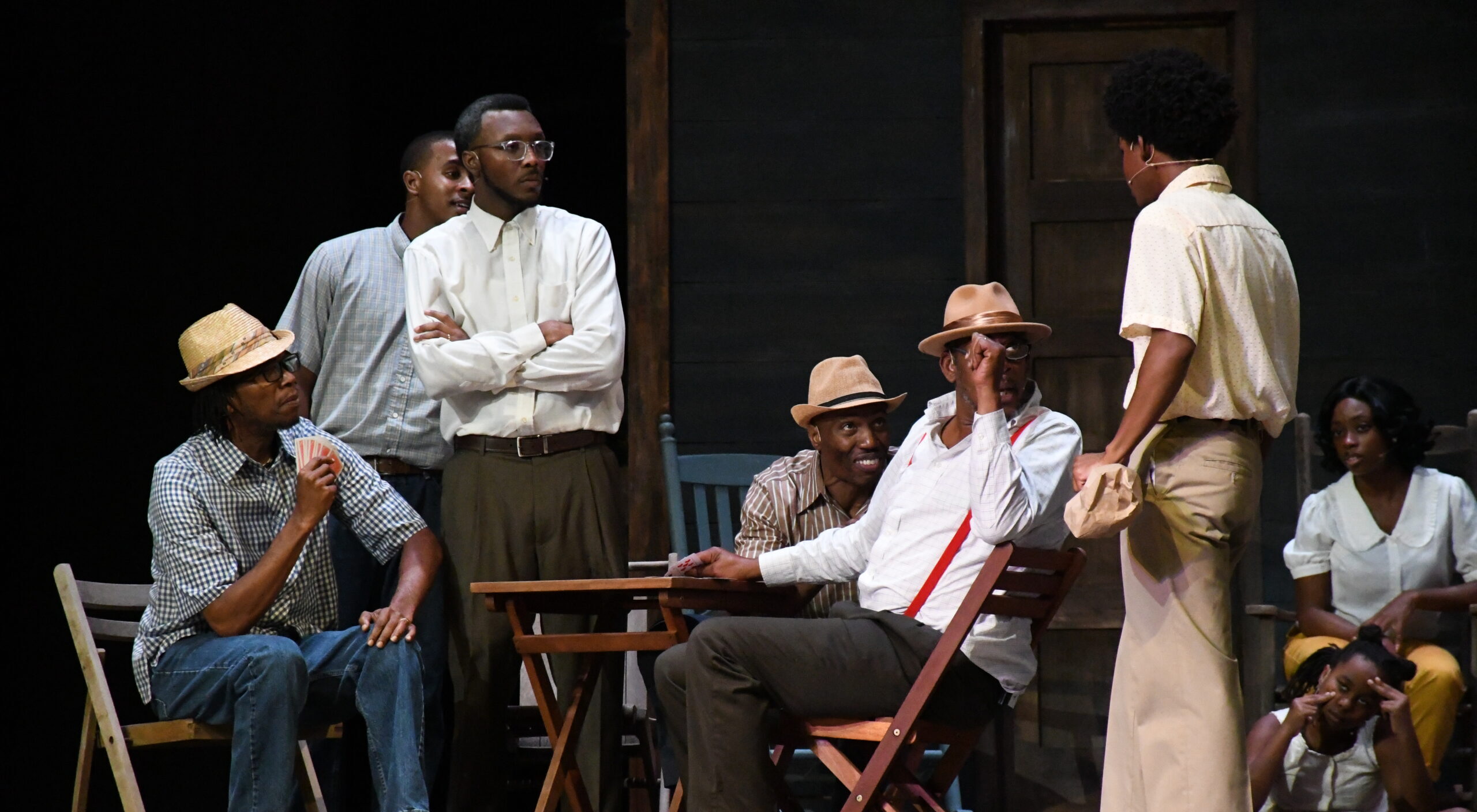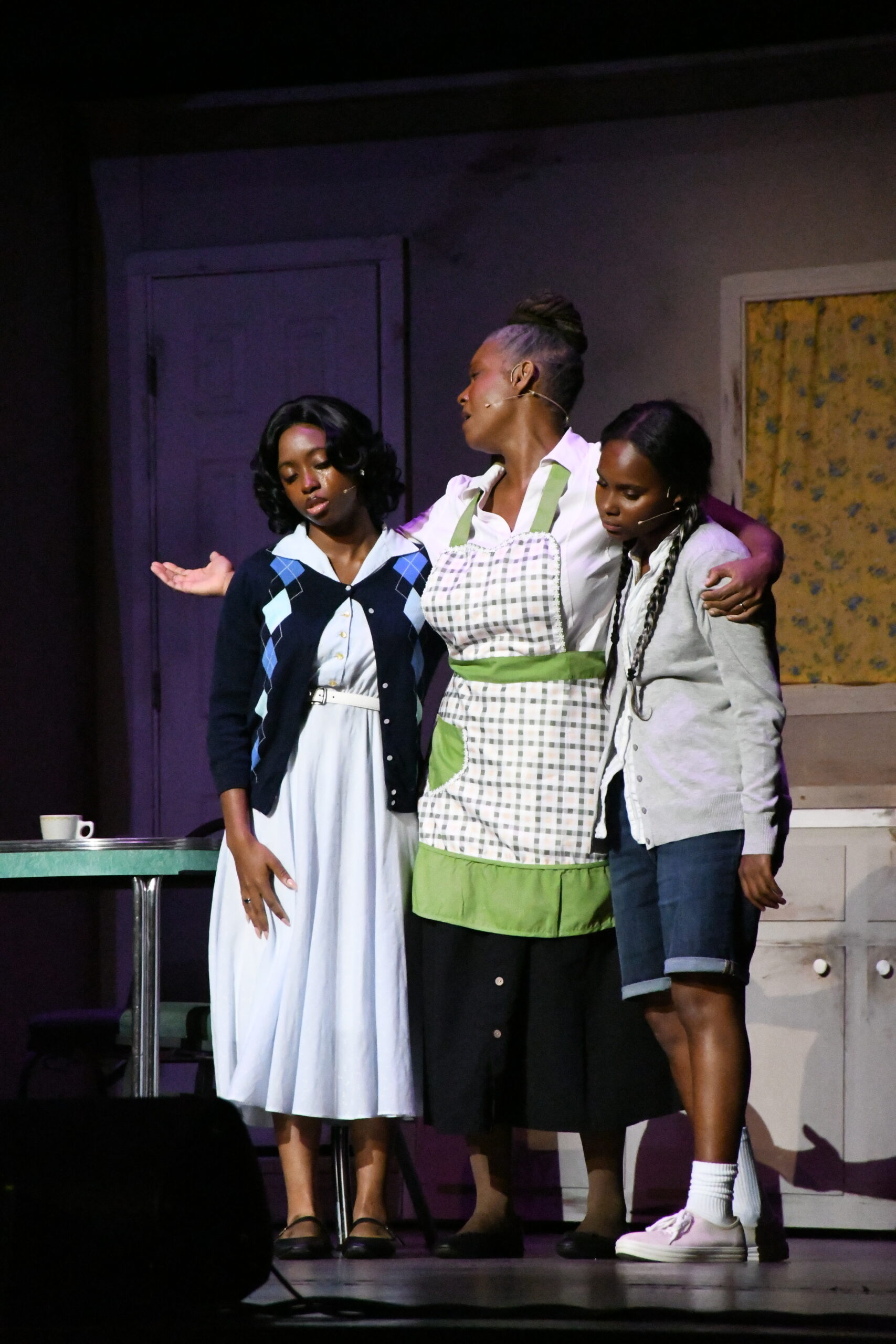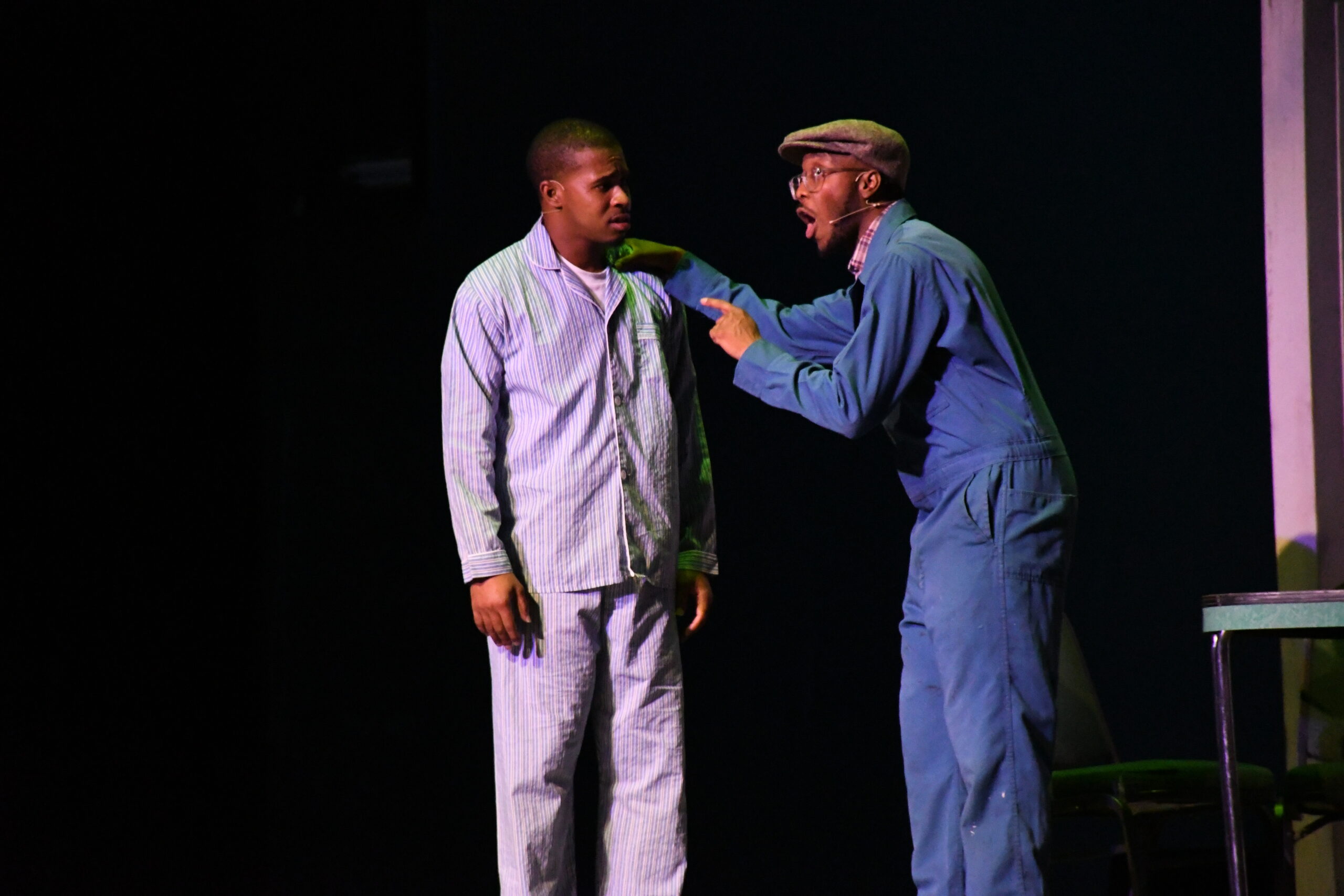
The Lessons of Linnentown: Spotlighting Whitehead’s story
A cool gust of wind circulates The Classic Center Theater, the curtains slowly drag back. A deep blue light floods across the stage. Highlighted by a creamy yellow spotlight on the far right of the stage, Hattie Thomas Whitehead (played by Renee Macdade) sits with her granddaughter Peyton Jackson (played by her descendant Peyton Jackson) upon a green bench. Jackson begins to ask her grandmother questions about her youth.
This moment is the opening scene for “Linnentown: The Musical,” the story of Whitehead’s experience growing up in the Linnentown community located off Baxter and Finley Street. In 1962, the University of Georgia acquired the land for additional student housing. The justification for these actions was the adjustment to the Housing Act of 1959 which allowed colleges and universities to participate in the Federal Urban Renewal Project without addressing the displacement of families.
“In that day it was like all the paper carried it as the slum off of Baxter, and not associating this area, this community, this neighborhood, with families and home ownership. It was just a slum,” Whitehead said.
For her, the stage is more than a platform; it is a space for remembrance and healing.
“I didn’t know how it was going to be received, but I knew that I had done my best to focus on the impact it had on families and the community. I knew that if I just stay with that, that should not be an argument,” Whitehead said.
Musical Director Micah Lewis emphasizes the importance of accurately sharing the story of Linnentown with younger generations. By continuing to tell the truth, the musical keeps the story alive.
“We erase things that can be forgotten, so it’s good to bring it back to light and see things. It doesn’t change what happened, but at least it’s good to know that Athens has recognized the wrong that was done and has made steps to acknowledge and try to correct,” Lewis said.
In September 2019, former Linnentown residents formed The Linnentown Project. This community led initiative was driven by a UGA library employee and researcher Joseph Carter who discovered documents about the urban renewal project. As the president and public outreach coordinator Whitehead regularly speaks about Linnentown’s story to the local population. In that same year Whitehead began to write her memoir “Giving Voice to Linnentown,” wanting to find greater ways to spread her experience. The book was self published in 2021.
With continuous efforts from the group, shortly after the book’s release, Mayor Kelly Girtz officially extended a public apology to the former residents. Clarke County also donated $2.5 million to families of those affected. As of September 2023, a portion of South Finley St. was renamed to Linnentown Lane.
“First, she wrote a book “Giving Voice to Linnentown,” and she started an organization (The Linnentown Project) influencing the creation of an African American History Center here in Athens, so our history would not be erased or forgotten. And so in order to raise funds for this, she (Whitehead) had the idea of writing a play with music,” Linnentown Musical director Freda Giles said.
With the first performance of “Linnentown: The Musical” debuting in 2024, this year’s production expands the performance by adding new cast members and musical arrangements.
The cast, musicians and production crew spent months rehearsing to ensure every moment reflects the reality of Linnentown. The performance was shown to approximately 1,000 middle and high school students on Sept. 11.
“Our first show (this year) was (for) the students… and it was a warm, fuzzy feeling inside when we finished the third show. I had a real sense of accomplishment just knowing the hard work and different things that paid off,” Lewis said. “And the funny thing about this is, this is a play/musical where you’re reenacting the person’s life who is right there. Ms. Hattie Whitehead was right there all the time. You think about different scenes, she lived through this.”
Whitehead attended nearly every rehearsal and appreciates how the musical allows her story to reach beyond the pages of her memoir.
“The musical also revealed to people that this community was just like our community. And how do you know that we were all raised alike. I’m like, ‘We are the same. We’re more the same than not.’ So the musical revealed that to a lot of people. I’ve had people come back and say, ‘I didn’t realize, we were all raised alike,’” Whitehead said.
The musical’s emotional power exists not just in its lyrics or story but in the combination through the music itself. Composer Alan Cook worked closely with the band during dress rehearsals to ensure that the music conveyed the appropriate emotions.
“Tapping into him (Cook) was just a wealth of knowledge helping to understand the play and how the musical component came to place. Because every lyric, every note, has a purpose in conveying the message of the scene,” Lewis said.
For Whitehead, in addition to writing the script, writing music was a whole new form of art. Even though she had never written a play or a musical she accepted the challenge. In 2022 she completed the script, but now she was faced with finding a location where the musical could come to life.
“After I wrote it, I came to the realization, ‘Okay, now, what am I gonna do with it?’ I got this script,” Whitehead said. “The biggest part to me was finding a place, finding someone to read the script and just say, ‘Okay, I think this could happen.’ The biggest thing for me was walking in to anyone and talking to them about a script that I wrote and saying it was my first script, and a musical script.”
With Whitehead’s inexperience in theater, she expected difficulty finding someone willing to provide a stage for the performance. However, she never expected that the first person she proposed the idea to would be the last.
“I explained to him (Classic Center Executive Director Paul Kramer) I had written this musical and I kept talking. I said, ‘I would love for the musical to open here as a fundraiser.’ He just kept looking and I just kept talking and he said ‘Yes,’” Whitehead said. “After the second meeting, (I left) the script with him saying, ‘Just read it and see what you think. If you think it won’t work, then I won’t be back.’”
After Kramer agreed to host the musical, it has continued to be performed at the Classic Center for two years. With the musical’s expansion this year, new actors and musicians learned to capture the story of Linnentown. The musical also relies heavily on behind-the-scenes staff, including lighting technicians, sound engineers and stage managers, to ensure the story comes alive.
“There were hundreds of light tech and sound cues throughout the entire play. Those guys work their tail off to make sure the right light comes on at the right time and the right space. And there were over 20 something microphones going sometimes simultaneously, at some other time, at different times you had the effects,” Lewis said.
“We erase things that can be forgotten, so it’s good to bring it back to light and see things. It doesn’t change what happened, but at least it’s good to know that Athens has recognized the wrong that was done and has made steps to acknowledge and try to correct,”
Additionally, Lewis emphasizes the educational value of the play. The story being made into musical form allows Linnentown’s history to reach younger generations, spreading awareness on the topic.
“If we don’t recognize or remember where we came from, sometimes we can repeat the same errors and not do well where we would be headed,” Lewis said.
Whitehead wants patrons to leave with information that acknowledges the steps forward and the history of the community.
“I thought that the book was an interesting book, but I thought that I would reach more people of different ages with a musical. How can you talk about my struggle too? It’s a tough subject to put on stage. But how can you do that and keep it lighthearted as well? It was tough to do that,” Whitehead said.
The production was a deeply local effort. Every member of the cast, crew and band is from Athens, reflecting the community’s shared connection to the story. Still, many did not know one another previously.
“This was our first time, for many of us, playing together. For a few, it was our first time even meeting each other. So it was nice to come together and be able to support Linnetown, not just to play, but (for) the community,” Lewis said.
For Giles in particular, working with Whitehead and learning about all she has endured was inspirational. Having an encouraging and welcoming person like Whitehead to work beside has brought joy to Giles’ experience.
“I have no idea how she (Whitehead) does all of the things she does. She is always saying, ‘Do you need anything?’ She was always out somewhere trying to fundraise so we’d have the resources we needed. She is the Energizer Bunny, and she just keeps going. I admire the passion that she has put into all of this. She wants to represent all the people who shaped her childhood and helped to make her the person that she is today,” Giles said.





